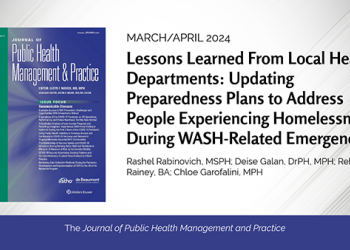 The U.S. Food & Drug Administration’s (FDA’s) Voluntary National Retail Food Regulatory Program Standards (Retail Program Standards) are designed to help food regulatory programs enhance the services they provide to the public.
The U.S. Food & Drug Administration’s (FDA’s) Voluntary National Retail Food Regulatory Program Standards (Retail Program Standards) are designed to help food regulatory programs enhance the services they provide to the public.
This post is part of NACCHO’s Retail Program Standards blog series, showcasing the progress that communities across the country have made in retail food protection. Each month, we are featuring the experiences, challenges, and successes of jurisdictions that have worked toward each standard.
All jurisdictions featured have participated in NACCHO’s Retail Program Standards Mentorship Program, which provides peer-to-peer assistance and intensive technical support to help jurisdictions conform with the standards efficiently and effectively.
This month we are focusing on Standard 7: Industry and Community Relations and we are featuring Lake County General Health District:
- Cady Stromp (with Davene Sarroco-Smith and Paul Stromp), Registered Sanitarian, Lake County General Health District, Mentor, Ohio
What steps did you take to get started in your work on Standard 7?
Stromp: Our first year enrolled in the Retail Program Standards, St. Louis County Department of Public Health was our mentor, and during our site visit we had the opportunity to attend their food safety task force meeting. With the guidance of St. Louis County and our completed self-assessment, we determined that we were closest to meeting Standard 7. We had already met the first educational outreach component and needed to work on the industry and consumer interaction by creating an annual food safety task force meeting. We chose our first food safety task force topic of farmers markets and cottage foods due to the local involvement and prominence of these events in our communities.
What was your biggest challenge in working toward Standard 7, and how have you worked to overcome that challenge?
Stromp: We have found that our biggest challenge is finding current and relevant topics that interest both the food industry and consumers. Brainstorming with our fellow food staff members and finding needs from our food industry partners has led us to timely food safety topics of interest. Some of our past topics include food safety defense, acidified rice and sushi production, and companion animals in food establishments.
What outcomes and benefits came out of working on Standard 7?
Stromp: We created interactive relationships between regulatory agencies, food industry members, and the general public through the food safety task force meetings. Many of our meetings included speakers from the Ohio Department of Health and the Ohio Department of Agriculture as leading authorities of the topic of interest. The meetings give industry an opportunity to build a dialogue with state agencies, which strengthened our relationships with our local food industry members.
How do you sustain momentum in your work on Standard 7?
Stromp: The educational outreach component of Standard 7 is a continual process within the Lake County General Health District (LCGHD). We offer food safety educational trainings throughout the year and provide educational materials through social media outlets. We limited our industry and consumer interaction component to one annual food safety task force meeting. This has allowed us to focus our efforts to provide relevant food safety topics.
What tips do you have for other jurisdictions working toward Standard 7?
Stromp: We recommend that jurisdictions look for topics that are relevant to their own community. Educational outreach and interaction should focus on food safety topics that are meaningful to the targeted population. Guidance on working on Standard 7 can be obtained from most health jurisdictions that are working on the Retail Program Standards. We have found helpful and knowledgeable people throughout the country through our involvement with the NACCHO mentorship program.
Ed. Note: The FoodShield Mentorship Program Workgroup is a good resource to research forms and policies from multiple agencies; however, only mentorship program participants can access this workgroup. For others interested in viewing jurisdictions’ policies and forms, sign up for the FDA Retail Program Standards Resource Center on FoodSHIELD or view examples on NACCHO’s website.
How has your work on the Retail Program Standards overall affected your community in terms of public health outcomes?
Stromp: Partnerships have been created that provide consumers and food industry members with an ability to feel comfortable interacting with the regulatory agencies. Additionally, through FDA grant funds, LCGHD created the Food Safety Ninja program for use locally and nationally. It is located at www.foodsafetyninja.org and also accessible through NACCHO’s Toolbox. The website is free for use by the general public, local health departments, and federal organizations. The Food Safety Ninja website includes animated educational videos, quizzes, and print materials pertaining to food safety topics such as hand washing, date marking and other foodborne illness risk factors. The print materials can be downloaded and/or printed by anyone for use in food establishments or educational venues. The LCGHD uses the website not only as an educational tool but also as a corrective action component in our licensed facilities.
Stay tuned for the next post, which will focus on Standard 8: Program Support and Resources, coming in May.
Contact Amy Chang at [email protected] with any questions.






